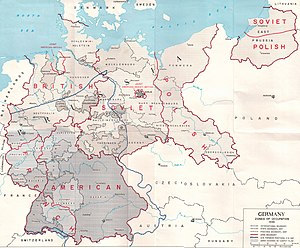
Back الانتهاكات الجنسية أثناء احتلال ألمانيا Arabic জার্মানি দখলকালে ধর্ষণ Bengali/Bangla Violacions durant l'ocupació d'Alemanya Catalan Perfortoj dum okupacio de Germanio Esperanto Violaciones durante la ocupación de Alemania Spanish تجاوز به زنان طی اشغال آلمان Persian Viols durant l'occupation de l'Allemagne French Pemerkosaan selama pendudukan wilayah Jerman ID Stupri durante l'occupazione della Germania Italian 연합국의 독일에 대한 강간 범죄 Korean

As Allied troops entered and occupied German territory during the later stages of World War II, mass rapes of women took place both in connection with combat operations and during the subsequent occupation of Germany by soldiers from all advancing Allied armies, although a majority of scholars agree that the records show that a majority of the rapes were committed by Soviet occupation troops.[1] The wartime rapes were followed by decades of silence.[2][3][4][5]
According to historian Antony Beevor, whose books were banned in 2015 from some Russian schools and colleges, NKVD (Soviet secret police) files have revealed that the leadership knew what was happening, but did little to stop it.[6] It was often rear echelon units who committed the rapes.[7] According to professor Oleg Rzheshevsky, "4,148 Red Army officers and many privates were punished for committing atrocities".[8] The exact number of German women and girls raped by Soviet troops during the war and occupation is uncertain, but historians estimate their numbers are likely in the hundreds of thousands, and possibly as many as two million.[9]
- ^ Women and War. ABC-CLIO. 2006. pp. 480–. ISBN 978-1-85109-770-8.
- ^ Cite error: The named reference
sanderwas invoked but never defined (see the help page). - ^ Allan Hall in Berlin (24 October 2008). "German women break their silence on horrors of Red Army rapes". Telegraph.co.uk. Archived from the original on 12 January 2022. Retrieved 10 December 2014.
- ^ "Raped by the Red Army: Two million German women speak out". The Independent. 15 April 2009. Retrieved 10 December 2014.
- ^ Susanne Beyer (26 February 2010). "Harrowing Memoir: German Woman Writes Ground-Breaking Account of WW2 Rape". Der Spiegel. Spiegel.de. Retrieved 10 December 2014.
- ^ Bird, Nicky (October 2002). "Berlin: The Downfall 1945 by Antony Beevor". International Affairs. 78 (4). Royal Institute of International Affairs: 914–916.
- ^ Cite error: The named reference
:1was invoked but never defined (see the help page). - ^ Cite error: The named reference
:0was invoked but never defined (see the help page). - ^ Naimark 1995, p. 133